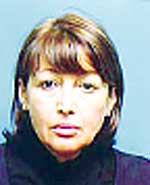Prof. Sylvia Schein, researcher of the late Crusader period, 2004-1947
Southern Uri

Sylvia Shane
Sylvia Schein, who died of cardiac arrest, was born in Lodz, Poland and immigrated to Israel in 1957. In her youth in Haifa, she suffered from the attitude of the Sabers towards the new immigrants, but when she went to Jerusalem to study history at the Hebrew University, everything changed. According to her study friend Sofi Menashe, now a professor of history at the University of Haifa, that's when she began to blossom: she studied with Prof. Yehoshua Prawer, who had a great influence on her, and even had him as a teaching assistant. After completing her master's degree with honors, she went to Cambridge and, under the guidance of Prof. Raymond Smail, wrote a doctorate on Europe and the Crusades in the years 1314-1291. She returned to Haifa, taught in the general history department and at the end of the 90s was the head of the department.
Shane's research questions were how the fall of the Crusader Kingdom (which existed from 1099 until the fall of Acre by the Crusaders in 1291) affected Europe and what lessons were drawn from the fall. In her book "Fideles Crucis" (Faithful to the Cross) she claimed that the Europeans seriously intended to reconquer the Holy Land, contrary to what other researchers believed. Among other things, there was talk of reforming the military orders, which many blamed for the discrimination; The creation of additional bases in the region, and the conquest of Egypt as a prerequisite for the conquest of the land, as well as an alliance with the Mongols from the east (when in 1300 the Mongols invaded the Land of Israel for a short time, hopes arose in Europe for the re-conquest of the Holy Land, even if this would be realized thanks to non-Christians).
In her articles in the magazine "Cathedral" Shane commented on ideas raised in Europe for the next crusader kingdom, if it were to arise: the establishment of a kind of "reception centers" for those who come, so that they can rest from the hardships of the road; The possibility of "choosing by lottery the names of the new settlements and naming them after their places of origin"; A proposal to settle in the Holy Land criminals from Europe whose sentences will be commuted in exile; And an idea drawn from Roger Bacon's inventions: to place huge mirrors at the borders of the kingdom, so that all the actions of the enemy would be reflected in them.
Another topic that interested Shane was the place of women in and after the Crusades. When in 1999 the Israel Museum celebrated the 900th anniversary of the establishment of the Crusader Kingdom, in the exhibition "Knights of the Holy Land", Shane contributed the chapter "Domination and the Ruled: Women in the Crusader Period", in which she showed that contrary to their inferior status and image in Europe, women in the Crusader Kingdom enjoyed better treatment. The protagonist of the episode is Melisande, who was the de facto queen of the kingdom (1152-1143) and according to the historian of the time, William of Tyre, "rose above the status of women to such an extent that she dared to take extremely important steps. Her ambition was to eradicate the nobility of the most respected and privileged princes and to show herself as equal to them."
https://www.hayadan.org.il/BuildaGate4/general2/data_card.php?Cat=~~~809389353~~~159&SiteName=hayadan
